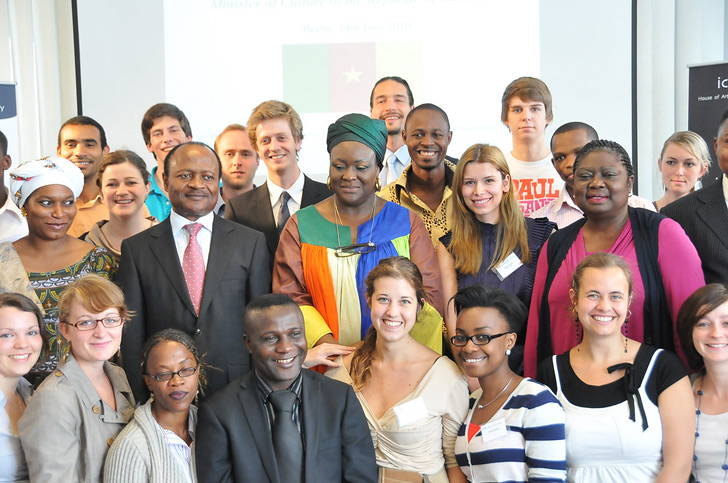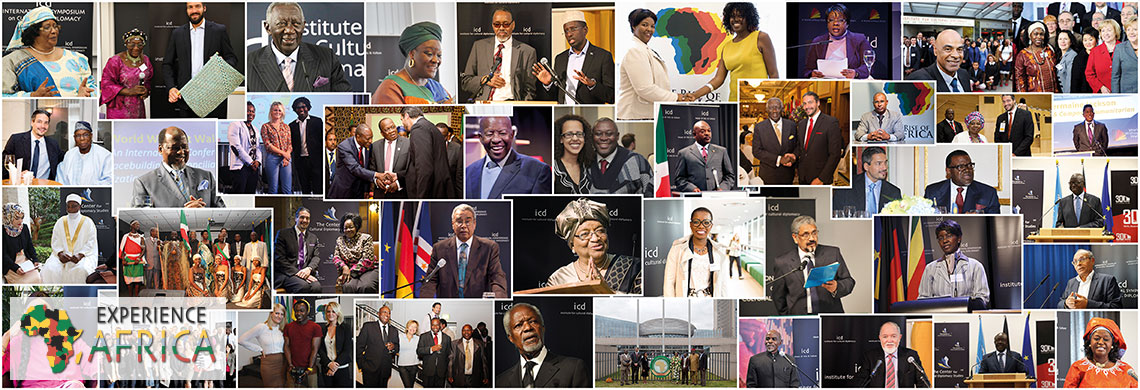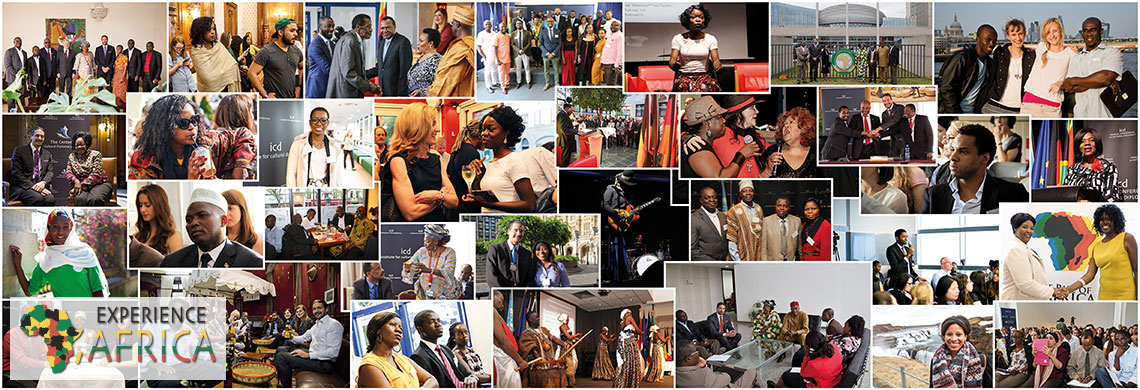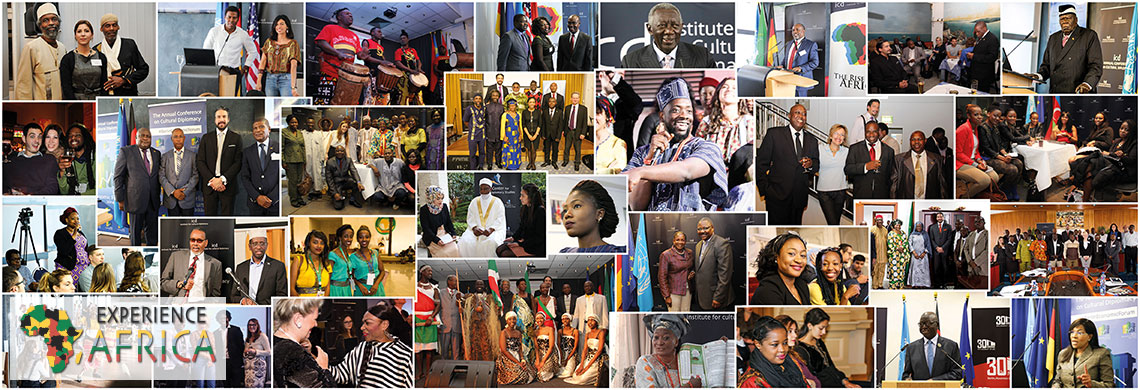The Rise of Africa
Innovative Strategies and Progressive Thinking for Africa's Renaissance
Berlin, 11th - 14th June 2010
Event-Review
Event-Review

Forum Report
The Weeklong Seminar for "Cultural Diplomacy in Africa: A Forum for Young Leaders", took place in Berlin from 11th – 18th June 2010. The program focused on the following subject: "The Development Game: Solving Problems and Creating Opportunities for a Stronger Continent". Additional focus was given to the history and development of cultural diplomacy.The speakers during the program included leading figures from the fields of politics and diplomacy, development, academia, civil society, and representatives from the private sector. The participants included young professionals and students, academic scholars, political and diplomatic representatives, civil society practitioners, journalists, and individuals from the private sector from around the world.
The following topics outline the views of the speakers on the relationship of current and future issues facing Africa and how these will affect its future development; Africa's challenges and opportunities in meeting the Millennium Development Goals, with a particular focus on climate change, political and economic stability, and sustainable development; the role of supranational economic unions in stabilizing the African continent, and the potential influence of a stronger African Union; as well as the involvement of international organizations and corporations in Africa and their influence on the continent's development and economy.
Other issues addressed were the emerging new models for African governance and development; the African Diaspora and its role in the development of Africa; the importance of Cultural Diplomacy and soft power in strengthening relations between African nations and within the nations themselves.
The conference offered insightful discussion and debate, after which the participants enjoyed the screening of several World Cup FIFA games, in different locations around the historical city of Berlin, specifically games played by African Teams. They visited the city through a walking tour. A number of cultural events were also organized in order for participants to gain an insight into African cultures.
The participants were awarded an official certificate of attendance at the end of the program. The certificates confirmed attendance and provided details of the speakers who took part during the week and the topics discussed.
Forum Speakers
H.E. Minister Ama Tutu Muna (Minister of Culture of the Republic of Cameroon)H.E Kazenambo Kazenambo (Minister of Youth, National Service, Sport and Culture of Republic of Namibia)
Marina Schuler (MP, German Parliament)
H. E. Joy Wheeler (Ambassador of Jamaica to Germany)
Dr. Ralf Brauksiepe (MP, German Parliament)
H.E. Professor Dr Isaac Chikwekwere Lamba (Ambassador of the Republic of Malawi to Germany)
Dr. Eva Latham (President of Human Rights Teaching International, The Hague, NL)
Professor Dr. Kai-Uwe Wellner (International Management and Controling, Augsburg University of Applied Sciences)
H.E. Fatoumata Sire Diakite (Ambassador of the Republic of Mali to Germany)
H.E. Carlos dos Santos (Ambasador of the Republic of Mozambique to Germany)
Aygul Murtazina (Attache of the Embassy of the Russian Federation to Chad)
Yehoeshahfaht Ben Israel (Representative of the Hebrew Israelite community of Jerusalem)
Nick Tolhurst (Managing director, CCA)
Wolfgang Hilberer (Konrad Adenauer Stiftung)
Peter Rees (ICD Development Director)
Sandile Gregory Gwexe (South African Embassy, Berlin)
John-Eli Matip Eichler (Lawyer and CEO of Blue Elephant)
Lulamile Ntonzima (Public Management Department, Cape Peninsula University of Technology, South Africa)
Locations
- ICD House of Arts and Culture
- DAAD (German Academic Exchange Service), Gendarmenmarkt
- Listros Art Gallery –
- Gallerie B1
Summary of Events
Friday, 11th of June: After a Welcome Speech by Mark Donfried, Founder of the ICD, the participants discovered the central themes of the weeklong conference. The place of Africa in globalisation and historically rooted inequalities between the West and the "Rest" were brought to the participants' attention. The implications of the FIFA World Cup were explored, as well as the role of the African Diaspora in the continent's development.Saturday, 12th of June: This day considered the realties of daily life in Africa. Corruption is a central barrier to the West's involvement in Africa's development. Additionally, human Rights are a central concern for the population of many African countries. The urgent need for sustained efforts and effective strategies were highlighted by the different speakers, such as education and projects to enhance cultural understanding.
Sunday, 13th June: Two days into the conference, the economic aspects of Africa's Rise were examined. The African Union and the South African Development Community initiatives were presented. The role and impact of European and Western businesses in the African continent were also exposed by representatives of the private sector.
Monday, 14th of June: The participants were introduced to the African organisations NEPAD and APRM, and the role they play in overcoming corruption was emphasized. Encouraging bilateral relations with nations outside the continent but also enhancing continental networks will be essential to Africa's economic and social development.
Tuesday, 15th of June: Participants were introduced to the DAAD and the different schemes the have set up in relation to Africa. grass-roots microcredit schemes and their potential for social development were also explained.
Wednesday, 16th of June: Corporate social responsibility and the role that African civil society can play were considered throughout the day. The failures of supranational organsiations in their approach to development will mean that Africa has to take responsibility for its problems and put in place leadership initiatives in order to move forward.
Thursday, 17th of June: The economic and social impacts of the FIFA World Cup in South Africa and the continent as a whole were evaluated. The link between sports and nation branding will be incremental to Africa's rebirth and the development of its cultural relations world-wide. The role of Young Africans was also highlighted for African nations to reach the development criteria of the OECD.
Friday, 11th of June 2010
Central Daily Themes- The traditional Western image of "the dark continent" as a poor, disease-ridden and war-struck continent, must be overcome.
- African deprivation has its historical roots in slavery, colonialism and dictatorship. But the continent is determined to move forward notably by the coming of the World Cup to South Africa in 2010.
- Fair trade will also be crucial in order to ensure that Africa can benefit from its rich natural and human resources. Cultural diplomacy can help spread a positive image of the African culture.
- However, if the locus of power remains in the favour of the West, Africa will continue to face the challenges it has endured during the previous centuries.
- The World Cup is highly symbolic for the rise of the African continent on the international stage However, its impacts must be directed towards sustainable development..
- The financial benefits will expand the South African economy, and will have direct implications for the rest of the continent. Although these financial gains will not be the solution to all of the challenges which face Africa today, including the HIV/AIDs epidemic and the transition to democracy, the World Cup tournament will however raise awareness of the international community.
- The African Diaspora can play a pivotal role in the rise of Africa. Taking the 'diasporic' message forward will be essential in order to further fortify diaspora and African relations.
- Pan-Africanism will ensure the survival of African culture, which is still very present in the Carribean diaspora. Increased interaction must take place under a structured commitment to a reciprocal relationship. This will allow the two factions to benefit form each other's expertise.
- Globalisation is affecting the African continent to a greater degree than other regions of the world. Employment policy in Africa has come to be a key integral issue within the global economic crisis. Strategies such as a coherent international employment and training programmes for women and youths would help temper the conséquences of the crisis.
- These changes must be enforced at local, national and international levels. The most effective way to increase African economic growth is through an equal partnership between the West and Africa. This mutual cooperation will help reduce the gap between the West and Africa.
Saturday, 12th June 2010
Central Daily Themes- Some State leaders in Africa do not want to relinquish their power due to their corrupt nature and have often manipulated the state constitution in order to stay in leadership.
- A strict enforcement of the law is necessary to protect the constitution, ensure justice and therefore promote good governance. Corruption cannot be completely disseminated, but it is possible for its degree and breadth to be lessened through the employment of mechanisms engrained into the bureaucratic and administrative Framework.
- Democracy should not be given a unified definition. Every location must develop an appropriate governance structure, fitted to its needs and aspirations and according to its capacity.
- Poverty and suffering are avoidable due to improvements in technology and communication.It is the responsibility of state leaders to protect their citizens in line with the Declaration of Human Rights.
- International organsisations need to take effective action agianst human rights abuses, in order to avoid tragédies such as the Civil War in Rwanda.
- The African Union is serving as a platform for African issues. However actors form outside such as the European Union, trying to get involved, sometimes hinders its efforts.
- 'Dignity' must be ensured within the lives of every person of the international community through imperatives, such as the right to food, water, education, health, and shelter.
- The most important processes to effectively maintain dignity are teaching and education.
- To be able to raise the living standards and promote human rights, the West must reach out to Africa. African poverty should not be treated as acceptable.
- Cultural diplomacy would be a helpful tool for countries experiencing ethnic or relegious tensions.
Sunday, 13th of June 2010
Central Daily Themes- The South African Development Community (SADC) grouping 5 countries (Namibia, Botswana, Mozambique, Zambia and Malawi), and the Customs Union group of 15, mostly promote trade and are heavily dominated by South Africa.
- Regional GDP and wealth is spread unequally among the community, notably between South Africa and the rest of the region. Countries mostly export raw materials to South Africa and import manufacture.
- Western companies have been investing in employee education and quality control as well as South Africa's mining and machinery.
- they need to adapt their branding to the cultural characteristics of African countries
- Despite the economic dynamism of the region, problems remain in South Africa and the SADC, such as educational deficits, crime and labour regulation and HIV. The main economic partner of the region is the EU, followed by China.
- The African Union is of high importance for the rise of Africa as it does not recognise leaders who have come into power by coup d'etat and isolate them through an established legal framework.
- At the moment, African countries can face the challenges of globalisation together if they unite and organise their civil society.
- Development practiced by the West is also problematic. Africans must lead such a change, and strategies must be adapted to different areas so as to overcome the "one size fits all" approach.
- The power of the Triad in shaping international agendas as well as nepotism and corruption remain a barrier to development.
- Intra-regional markets need to be developed and young Africans must return to Africa with the knowledge they have acquired abroad in order to participate in Africa's economic, social and political progress.
Monday, 14th of June 2010
Central Daily Themes- The AU represents a new partnership for African countries. NEPAD and APRM are two organsiations supporting the AU in which African states are determined to work together.
- The AU represented a huge move forward from the AOU, and inaugurated a major paradigm shift. It incorporates the principle of non-intervention. However, the union has the right to intervene in cases of genocide, war crimes, and crimes against humanity, as well as (unconstitutional?) acts from governments.
- The objectives of these mechanisms are to eradicate poverty, encourage sustainable growth, and enhance participation in the world economy and politics.
- Since 1999 with Putin, Russian-African relations gained a new positive momentum. A dialogue with the AU was launched, supported by economic projects and official visits.
- Involvement of Russia in Africa is concentrated on primary resources such as Uranium and the weapon industry under control and monitoring from the government. Generally, Russian business ventures are very present on the continent. Through the UN and the IMF, Russia contributes to peace-keeping missions. It has granted debt relief from many loans given to African countries during the Cold War.
- Humanity has always needed diplomacy due to the common values that permeate mankind. Cultural diplomacy in Africa equates to the acceptance and sharing of customs, values and modes of thought.
- There is a systematic equality between cultures and therefore no hierarchy among them. For example, Cameroon possesses a high degree of cultural diversity but the country lives in peace and harmony.
- In the construction of Africa's rebirth, international corporations must support the cultural integration of the AU in order to see the most rapid socio-economic and political improvements.
- The importance of education, development and capacity building must not be underestimated. Many African leaders acknowledge that corruption is still present on the continent.
- Personal enlightenment and individual capacity building must be fostered before building up a community, which will then be able to make a real difference.
Tuesday, 15th June 2010
Central Daily themes- The example of social work and Microcredit in Ethiopia offer many insights for the types of projects that could be undertaken on a continent wide level.
- The creation of small scale and legalised jobs in the service sector can help young Africans sstain themselves and finance their education.
- German-Ethiopian art initiatives show how the availability of African art in Europe can help cultural understanding between the two regions.
- These different strategies, at local as well as international levels, represent real opportunities to alleviate poverty and and achieve peaceful inter-cultural relations.
- Public diplomacy in Germany is mostly carried out by government funded institutions, but also non-governmental and independent entities
- The DAAD is the German national agency for international academic cooperation and exchange. It is an independent association of universities with 231 member institutions and 123 student bodies.
- It fosters long term cooperation between German students abroad and foreign students in Germany through a number of scholarships, funds and frameworks.
- Its cooperation in terms of Higher Education in Developing Countries has been allocated 32,640 Mio Euros in the DAAD Budget for 2010.
- The DAAD has developed the African Good Governance Network (AGGN), in which the strategies are to organise an international network of future African leaders in order to strengthen democratic structures in sub-Saharan Africa, and foster Cooperation of the members in aspects of regional "Good Governance.
- It has outlined three challenges for the future: to establish developing countries as global players in higher Education and Research, but also as investors – pursuing their own agenda in higher Education and Research, and end Least developed countries' reliance on donor contributions for the development of their education sectors.
Wednesday, 16th of June 2010
Central Daily Themes- Corporate social responsibility is mostly a matter of self-interest. For instance, Walmart changed their packaging from oil to plastic-based, and made immediate profit.
- To solve Africa's challenges, such as pollution, poverty, education, war, research and technology, the United Nations has many sub-agencies. Successes have been limtiied and It is unsure whether the World Bank is a better solution.
- Another option is using corporations, as opposed to national governments, in order to build up the infrastructure around the continent, needed for international intra-regional commerce.
- A vast majority of African countries can be classified as unfree (according to the Freedom House Index), with low life expectancies, faulty infrastructure, corruption and violence.
- Issues of internal displacement, low educational standards, and dependence on raw materials cannot be put into the hands of corrupt states or the "help" industry but need to be entrusted to African people.
- Developing a middle class should help solve problems at their base. Supra-national organisations sometimes overlook this aspect and favour a top-down approach.
- Africa must put an end to blaming Europe and the West for its shortcomings. The problem is one of leadership; Africa should adapt its fruitful mind to personal enhancement for the benefit of the community, and take responsibility for its own socio-economic development.
- Regardless of the international pressures Africa faces, the continent must not accept Western models and forms of knowledge as a given, and must develop their own traditional models and strategies.
- Leaders must be committed to their promises and to the protection of their people's health and welfare.
- A key to human development is health, especially protective and preventative, as opposed to the present expensive and exploitative explosion of curative health.
Thursday, 17th June 2010
Central Daily Themes- The African Renaissance is now being enacted through the New Economic Partnership for Africa, and the African Union.
- Foreign policy promotes an egalitarian, democratic and unified continent. The African Peer Review Mechanism works to set common criteria for partnerships, such as the SADC and the APRM voluntary project.
- The World Cup, and the Mali project to preserve Timbuktu manuscripts are components of Africa's development.
- Such projects help to dispel the myth of violence and ignorance, and promote public awareness, foster unity, and financially boost tourism outside of sports celebrations.
- The ideal state fits the definition of external national sovereignty, and internally, Hegel's well-balanced state of individual and civil society. Africa has gone over the one billion population threshold and still holds a majority of the world's natural resources, but life expectancy remains low.
- Furthermore, no country fits the OECD criteria of a developed nation, and there is no concerted policy to develop an industry to export manufacture. This is the only way for countries to become NIPs.
- The influence of sporting role models must not be underestimated with regard to the impact they can have in the field of cultural diplomacy.
- Looking at sports initiatives being used to strengthen cultural relations, can also offer insights in order to develop such projects further.
- The African community can face the challenges of globalisation if it unites. Internal economic intergration must be strengthened.
- The young people of Africa have a role to play in Africa's economic future on both continental and international levels.



